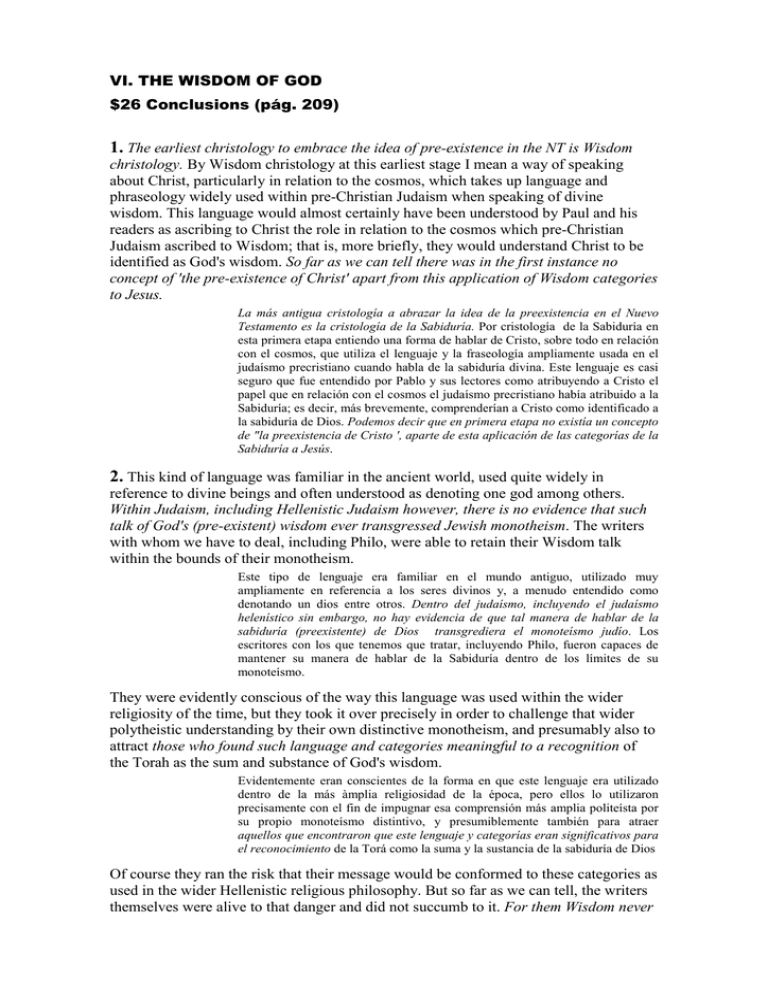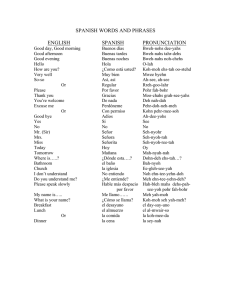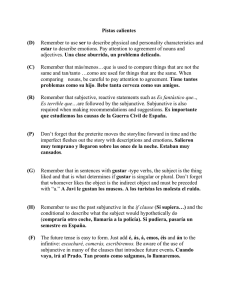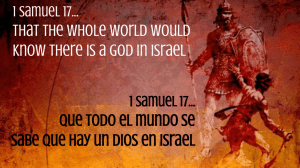VI. THE WISDOM OF GOD $26 Conclusions (pág. 209) 1. The
Anuncio

VI. THE WISDOM OF GOD $26 Conclusions (pág. 209) 1. The earliest christology to embrace the idea of pre-existence in the NT is Wisdom christology. By Wisdom christology at this earliest stage I mean a way of speaking about Christ, particularly in relation to the cosmos, which takes up language and phraseology widely used within pre-Christian Judaism when speaking of divine wisdom. This language would almost certainly have been understood by Paul and his readers as ascribing to Christ the role in relation to the cosmos which pre-Christian Judaism ascribed to Wisdom; that is, more briefly, they would understand Christ to be identified as God's wisdom. So far as we can tell there was in the first instance no concept of 'the pre-existence of Christ' apart from this application of Wisdom categories to Jesus. La más antigua cristología a abrazar la idea de la preexistencia en el Nuevo Testamento es la cristología de la Sabiduría. Por cristología de la Sabiduría en esta primera etapa entiendo una forma de hablar de Cristo, sobre todo en relación con el cosmos, que utiliza el lenguaje y la fraseología ampliamente usada en el judaísmo precristiano cuando habla de la sabiduría divina. Este lenguaje es casi seguro que fue entendido por Pablo y sus lectores como atribuyendo a Cristo el papel que en relación con el cosmos el judaísmo precristiano había atribuido a la Sabiduría; es decir, más brevemente, comprenderían a Cristo como identificado a la sabiduría de Dios. Podemos decir que en primera etapa no existía un concepto de "la preexistencia de Cristo ', aparte de esta aplicación de las categorías de la Sabiduría a Jesús. 2. This kind of language was familiar in the ancient world, used quite widely in reference to divine beings and often understood as denoting one god among others. Within Judaism, including Hellenistic Judaism however, there is no evidence that such talk of God's (pre-existent) wisdom ever transgressed Jewish monotheism. The writers with whom we have to deal, including Philo, were able to retain their Wisdom talk within the bounds of their monotheism. Este tipo de lenguaje era familiar en el mundo antiguo, utilizado muy ampliamente en referencia a los seres divinos y, a menudo entendido como denotando un dios entre otros. Dentro del judaísmo, incluyendo el judaísmo helenístico sin embargo, no hay evidencia de que tal manera de hablar de la sabiduría (preexistente) de Dios transgrediera el monoteísmo judío. Los escritores con los que tenemos que tratar, incluyendo Philo, fueron capaces de mantener su manera de hablar de la Sabiduría dentro de los límites de su monoteísmo. They were evidently conscious of the way this language was used within the wider religiosity of the time, but they took it over precisely in order to challenge that wider polytheistic understanding by their own distinctive monotheism, and presumably also to attract those who found such language and categories meaningful to a recognition of the Torah as the sum and substance of God's wisdom. Evidentemente eran conscientes de la forma en que este lenguaje era utilizado dentro de la más àmplia religiosidad de la época, pero ellos lo utilizaron precisamente con el fin de impugnar esa comprensión más amplia politeísta por su propio monoteísmo distintivo, y presumiblemente también para atraer aquellos que encontraron que este lenguaje y categorías eran significativos para el reconocimiento de la Torá como la suma y la sustancia de la sabiduría de Dios Of course they ran the risk that their message would be conformed to these categories as used in the wider Hellenistic religious philosophy. But so far as we can tell, the writers themselves were alive to that danger and did not succumb to it. For them Wisdom never really became more than a convenient way of speaking about God acting in creation, revelation and salvation; Wisdom never became more than a personification of God's own activity. Por supuesto que corrían el riesgo de que su mensaje se conformara a estas categorías tal como las utilizaba la más amplia filosofía religiosa helenística. Pero en la medida en que lo podemos afirmar, los propios escritores estaban atentos a ese peligro y no sucumbieron a él. Para ellos la sabiduría nunca llegó a ser más de una forma conveniente de hablar de Dios actuando en la creación, en la revelación y en la salvación; La Sabiduría nunca llegó a ser más que una personificación de la propia actividad de Dios. 3. When and how did earliest Christianity take up this language? Thanks to Mt we can recognize that there was a "when", that there was a development in the course of which Wisdom categories were applied to Christ himself as a new step in Christian thinking about Christ. ¿Cuándo y cómo la primera cristiandad tomó este lenguaje? Gracias a Mateo podemos reconocer que hubo un “cuando”, que hubo un desarrollo en el curso del cual las categorías de la Sabiduría se aplicaron al mismo Cristo como un nuevo paso en el pensamiento cristiano sobre Cristo. The earliest large collection of Jesus's sayings (Q) spoke of wisdom, and presented much of Jesus's teaching in the form of Jewish wisdom. But nowhere in Q can we sat with any confidence that Jesus himself was identifies as Wisdom. The implication is that the same was true also of Jesus' own teaching: there is no evidence in the earliest traditions of Jesus' ministry that he understood himself as Wisdom, or as the incarnation of (pre-existent) Wisdom. La primitiva gran colección de dichos de Jesús (Q) habla de la sabiduría, y presenta gran parte de la enseñanza de Jesús en forma de la sabiduría judía. Pero en ninguna parte del documento Q, podemos asegurar con confianza que Jesús mismo fuera identificado con la Sabiduría. La implicación es que lo mismo es cierto de la propia enseñanza de Jesús: no hay evidencia en las primeras tradiciones del ministerio de Jesús que él se comprendiera como la Sabiduría, o como la encarnación de la (pre-existente) Sabiduría. Throughout the earliest stages of the Synoptic tradition prior to Mt, but including Lc, Jesus is presented not as Wisdom, but as the messenger of Wisdom, as the eschatological envoy of (God in his) wisdom. A lo largo de las etapas más primitiva de la tradición sinóptica anteriores a Mt, incluyendo también a Lc, Jesús es presentado no como la Sabiduría, sino como el mensajero de la Sabiduría, como el enviado escatológico de (Dios en su) sabiduría. And the implication is that Jesus thought of himself (if at all) in the same terms. Only Mt moves beyond this to embrace an explicit Wisdom christology (Jesus = Wisdom) and he does this by careful but obviously deliberate redaction of his Q source. In short, the Synoptic tradition strongly suggests that there was a time when there was no Wisdom christology; but we also know of a later stage when Wisdom christology could be taken for granted (in the hymns of Colossians and Hebrews and in John). Mt shows us one of the transition points. Y la consecuencia es que Jesús pensaba de sí mismo en los mismos términos. Sólo Mt supera estos términos para abrazar una explícita “cristología de la Sabiduría” (Jesús = Sabiduría), y lo hace mediante una redacción cuidadosa, obviamente deliberada, de su fuente Q. En pocas palabras, la tradición sinóptica sugiere que hubo un tiempo en que no existía una cristología de la Sabiduría, pero también sabemos de una etapa posterior, en que la cristología de la sabiduría puede ser testimoniada (en los himnos en los Colosenses y Hebreos y en Juan). Mt nos muestra uno de los puntos de la transición. 4. How did the transition from a christology of Jesus the eschatological teacher of wisdom to a Wisdom christology come about? Paul's first letter to the Corinthians may give us the answer. For in Corinth he was confronted by a group whose views were marked both by talk of wisdom and by a too casual attitude to creation. To respond to this situation Paul took up the language of wisdom and drawing on the wisdom tradition of Hellenistic Judaism and on Stoic terminology he framed a Christology which met the needs of the Corinthian situation. ¿Cómo fue la transición de una cristología de Jesús como el escatológico maestro de sabiduría a una cristología de la Sabiduría? La primero carta de Pablo a los Corintios nos puede dar la respuesta. Porque en Corinto Pablo fue interpelado por un grupo cuyas opiniones estaban marcadas tanto por una manera de hablar de la sabiduría como por una actitud demasiado informal respecto la creación. Para responder a esta situación Pablo tomó el lenguaje de la sabiduría y según el modelo de la tradición de la sabiduría del Judaísmo helenístico y de la terminología estoica construyó una cristología que respondía a las necesidades de la situación de Corinto. In this he presented Christ as the one whose death and resurrection fulfilled God's original purpose for creation and for men and so served to characterize and define the wisdom of God in a normative way — Christ crucified is the wisdom of God (I Cor. 1.24, 30). He presented the Lordship of Christ within the context of Jewish monotheism and Christ as one whom Christians now see to embody and mediate that power of God which created and sustains the world (I Cor. 8.6). En esta carta presenta a Cristo como aquel cuya muerte y resurrección han realizado completamente el propósito original de Dios para la creación y para los hombres y por lo servido para caracterizar y definir la sabiduría de Dios de una manera normativa: Cristo crucificado es la sabiduría de Dios (I Cor 1,24; 30). Presenta el Señorío de Cristo en el contexto del monoteísmo judío y Cristo como aquel a quien los cristianos ven ahora encarnando y mediando el poder de Dios que creó y sostiene el mundo (I Cor. 8,6). The Colossian hymn probably expresses and develops the same insight (written in one of the Pauline churches) and the christology involved spread quickly throughout the Hellenistic churches (as again Matthew, Heb. 1.2f. and John indicate). El himno de la carta a los Colosenses (escrita en una de las iglesias paulinas), probablemente, expresa y desarrolla el mismo punto de vista y la cristología involucrada se extendió rápidamente a través de las iglesias helenísticas (como nuevo Mateo,. Heb 1.2f. Y Juan indican). In the early stages of this development at any rate it would be inaccurate to say that Christ was understood as a pre-existent being become incarnate, or that Christ himself was thought to have been present and active in creation. With the Fourth Gospel it may be another story, in part at least (see below §30.1); En las primeras etapas de este desarrollo en todo caso sería inexacto decir que Cristo fue entendido como un ser preexistente que llegó a encarnarse, o que el mismo Cristo fuera comprendido como que había estado presente y activo en la creación. Con el cuarto evangelio puede ser otra historia, al menos en parte (ver más abajo §30.1); But with Matthew there seems to be no thought of pre-existence involved; and in the Pauline letters and probably the introduction to Hebrews also the thought is primarily of Christ as the eschatological embodiment of the wisdom of God, as the one through whom the creator God in all his fullness had revealed himself most clearly and definitively for man's salvation and creation's renewal. Pero, respecto a Mateo, no parece haber ninguna idea de preexistencia involucrada; y en las cartas paulinas y probablemente en la introducción a Hebreos también el pensamiento es sobre todo de Cristo como la encarnación escatológica de la sabiduría de Dios, como aquel por quien el creador Dios en toda su plenitud se había revelado más clara y definitivamente para la salvación del hombre y la renovación de la creación. The fact that Paul can speak of 'one Lord' in such close association with the 'one God' as he does in I Cor. 8.6 (just as elsewhere he speaks of God as 'God of our Lord Jesus Christ' - see above p. 182) can only mean that he sees Jesus not as a pre-existent divine being, but as a man, a Jew, whose God is the one God, and yet who so embodied God's creative power and saving wisdom (particularly in his death and resurrection) that he can be identified as 'the power of God and the wisdom of God'. El hecho de que Pablo puede hablar de "un solo Señor ' en tal estrecha asociación con el" único Dios "como lo hace en I Cor. 8.6 (al igual que en otros lugares se habla de Dios como "Dios de nuestro Señor Jesucristo": véase más arriba p 182) sólo puede significar que él ve a Jesús, no como un ser divino preexistente, sino como un hombre, un Judío, cuyo Dios es el único Dios, y sin embargo, como quien encarnaba el poder creador de Dios y la sabiduría salvífica (sobre todo en su muerte y resurrección) que podía ser identificado como "el poder de Dios y la sabiduría de Dios". In short, if the contemporary cosmologies of Hellenistic Judaism and Stoicism determined what words should be used in describing the cosmic significance of the Christ-event, the meaning of these words is determined by the Christ-event itself. En resumen, si las cosmologías contemporáneas del judaísmo helenístico y del estoicismo determinaban qué palabras se debían utilizar para describir el significado cósmico del acontecimiento de Cristo, el significado de estas palabras está determinado por el acontecimiento de Cristo mismo. 5. At the same time, given the understanding of divine wisdom within Hellenistic Judaism at the time of Paul, we can see how it was that his language should both retain Wisdom christology within the bounds of Jewish monotheism and yet at the same time drive the Christianity expressing it in a Trinitarian direction. Al mismo tiempo, dada la comprensión de la sabiduría divina en el judaísmo helenístico en tiempos de Pablo, podemos ver cómo fue que su lenguaje tanto mantuvo la cristología de la Sabiduría dentro de los límites del monoteísmo judío y como, sin embargo, al mismo tiempo impulsó el cristianismo a expresarse en un sentido trinitario. If I Cor. 8.6 and Col. 1.15-20 (also Heb. 1.2f) should not be interpreted in a simplistic way as attributing personal pre-existence to Jesus Christ, neither can these passages be reduced to a mere doctrine of Jesus as a man inspired by God. Si I Cor 8, 6 y Col 1, 15-20 (también Heb 1,2s) no deben interpretarse de manera simplista como atribuyendo una preexistencia personal a Jesucristo, ni pueden estos pasajes reducirse a una mera doctrina de Jesús como un hombre inspirado por Dios. Here we may observe is the difference between ch. V and ch. VI: in ch. V we saw that the understanding of the earthly Jesus in relation to the Spirit is essentially that of inspiration; but in ch. VI we have had to speak in terms of identification. In this distinction we cross the boundary between 'inspiration' and 'incarnation':]esus = (the eschatological) prophet inspired by the Spirit; but Jesus = Wisdom. Aquí podemos observar cuál es la diferencia entre cap. V y cap. VI: en el cap. V vimos que la comprensión del Jesús terrenal en relación con el Espíritu es esencialmente el de la inspiración; pero en el cap. VI hemos tenido que hablar en términos de identificación. En esta distinción se cruza el límite entre "inspiración" y "encarnación": Jesús = (escatológico) profeta inspirado por el Espíritu; pero Jesús = Sabiduría. Again, we repeat, the thought is not of Jesus himself as there in the beginning, despite what to us seems the 'obvious' meaning of the language used in I Cor 8, 6, Col 1, 16 and Heb 1, 2, but of Jesus as the man Wisdom became; not merely inspired, but became. Una vez más, repetimos, la idea no de sí mismo, ya que en un principio es Jesús, a pesar de lo que nos parece el "obvio" que significa el lenguaje utilizado en I Cor 8, 6, Col 1, 16 y Hebreos 1, 2, sino la de Jesús como el hombre que devino la Sabiduría; no sólo inspirado, sino que llegó a ser. He who espouses a Wisdom Christology does not assert that Christ was a pre-existent being, but neither does he assert that Christ was simply a man used by God, even in a climactic way. He asserts rather that Christ fully embodies the creative and saving activity of God, that God in all his fullness was in him, that he represents and manifests all that God is in his outreach to men. El que propugna una cristología de la Sabiduría no afirma que Cristo era un ser preexistente, pero tampoco afirmar que Cristo era simplemente un hombre utilizado por Dios, aunque sea de forma culminante. Él afirma más bien que Cristo encarna plenamente la actividad creadora y salvadora de Dios, que Dios en toda su plenitud estaba en él, que él representa y manifiesta todo lo que Dios es en su aproximación a los hombres. We can express this as the divinity or even deity of Christ, so long as we understand what that means: the deity is the Wisdom of God, for the Wisdom of God is God reaching out to and active in his world. So the deity of Christ is the deity of Wisdom incarnate; that is, to recognize the deity of Christ is to recognize that in Christ God manifested himself, his power as Creator his love as Saviour, in a full and final way. Podemos expresar esto como la divinidad o incluso la deidad de Cristo, con tal de que entendemos lo que eso significa: la deidad es la Sabiduría de Dios, pues la Sabiduría de Dios, es Dios llegando a su mundo y actuando en él. Así que la deidad de Cristo es la deidad de la Sabiduría encarnada; es decir, reconocer la deidad de Cristo es reconocer que en Cristo Dios se manifestó, manifestando su poder como Creador y su amor como Salvador, de manera total y definitiva. But, to make the point one last time, we should use the language of incarnation at this point only if we use it properly. For while we can say that divine wisdom became incarnate in Christ, that does not mean that Wisdom was a divine being, or that Christ himself was pre-existent with God, but simply that Christ was (and is) the embodiment of divine Wisdom, that is, the climactic and definitive embodiment of God's own creative power and saving concern. Pero, para puntualizar por última vez, debemos usar el lenguaje de la encarnación en este punto sólo si lo utilizamos correctamente. Pues mientras podemos decir que la sabiduría divina se encarnó en Cristo, eso no quiere decir que la Sabiduría era un ser divino, o que el propio Cristo fue preexistente con Dios, sino simplemente que Cristo era (y es) la encarnación de la Sabiduría divina, es decir, la encarnación culminante y definitiva del propio poder creador de Dios y de su interés salvífico. Herein we see the origin of the doctrine of the incarnation. Aquí vemos el origen de la doctrina de la encarnación. Si puedes mejorar la traducción Gracias






